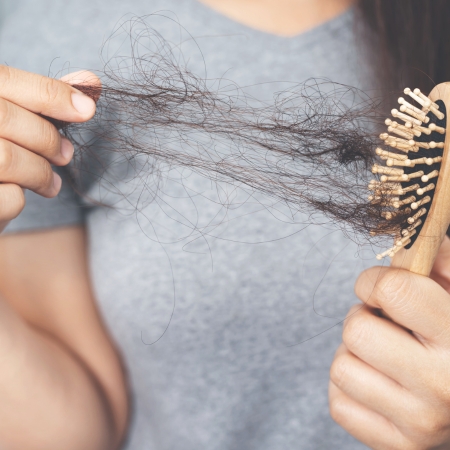Understanding Alopecia Areata: Causes, Symptoms, and
Treatment Options
What is Alopecia Areata?
Alopecia Areata is a condition that leads to the sudden
development of small, round bald patches on the scalp or other hairy areas of
the body. These patches may grow over time and can affect areas such as
eyebrows, eyelashes, beards, and even private parts. It is a chronic autoimmune
disorder where the immune system mistakenly attacks healthy hair follicles,
causing hair loss. While it is not painful or life-threatening, the visible
hair loss can significantly impact an individual’s confidence and emotional
well-being.
The term "alopecia" is derived from the Latin word
meaning "baldness," and "areata" refers to the
characteristic patchy hair loss seen in this condition. Although it can affect
individuals of all ages, alopecia areata is most commonly observed in children
and young adults.
Why Does Alopecia Areata Occur?
Alopecia areata is an autoimmune condition, meaning the
body’s immune system fails to recognize its own tissues and mistakenly attacks
them. In this case, the hair follicles are targeted, disrupting the natural
hair growth cycle. Though the exact trigger is unknown, genetic predisposition
and environmental factors, such as stress or infections, are believed to play a
role.
Some individuals with alopecia areata may also have a family
history of other autoimmune diseases, such as hypothyroidism, diabetes, or
rheumatoid arthritis, which increases their risk.
Symptoms of Alopecia Areata
The primary symptoms include:
- Patchy
Hair Loss: Smooth, circular bald spots on the scalp or body.
- Exclamation
Mark Hair: Short, broken hair at the edges of the bald patches,
resembling an exclamation mark.
- Scalp
Irritation: Mild itching or discomfort in some cases.
- Nail
Changes: Pitting or discoloration of nails in severe cases.
- Widespread
Hair Loss: In advanced forms, hair loss may extend to the entire scalp
(Alopecia Totalis) or even the entire body (Alopecia Universalis).
Causes of Alopecia Areata
Key contributing factors include:
- Genetics:
A family history of autoimmune disorders.
- Immune
System Dysregulation: The immune system attacks hair follicles during
the growth phase.
- Chemical
Exposure: Prolonged use of hair products with harmful chemicals.
- Hormonal
Imbalance: Life stages such as puberty, menopause, or post-pregnancy.
- Stress
and Lifestyle: Psychological stress or mechanical factors like tight
hairstyles.
- Underlying
Conditions: Other autoimmune or fungal infections may also contribute.
How Homeopathy Can Help Treat Alopecia Areata
Homeopathy provides a holistic approach to treating alopecia
areata by correcting the underlying immune imbalance rather than just
addressing the symptoms. It is particularly effective in early-detected cases
and mild to moderate hair loss.
Benefits of Homeopathy for Alopecia Areata:
- Stimulates
the immune system to restore healthy hair growth.
- Reduces
the chances of relapse and promotes long-term relief.
- Offers
personalized remedies tailored to each patient’s unique condition.
- Avoids
harmful side effects associated with conventional treatments like steroids
or immunosuppressants.
Common homeopathic remedies include Phosphorus, Natrum
Muriaticum, Lycopodium, and Vinca Minor, among others. It’s
crucial to consult a qualified homeopath, as self-medication can be ineffective
or even harmful.
How Effective is Homeopathy?
The success of homeopathy depends on various factors:
- Severity
of the Condition: Early and mild cases respond better than severe or
long-standing ones.
- Associated
Autoimmune Diseases: Recovery is slower in patients with additional
autoimmune conditions.
- Scarring
Alopecia: Cases involving scarring, like Lichen Planopilaris,
are often irreversible.
- Children
vs. Adults: Children typically show better outcomes compared to
adults.
On average, homeopathic treatment can take anywhere between
4 months to 2 years, depending on the extent of the condition and the patient’s
overall health.
Complementary Lifestyle Tips for Managing Alopecia Areata
In addition to medical treatment, adopting a healthy
lifestyle can accelerate recovery:
- Diet:
Incorporate iron-rich foods (e.g., dates, spinach), protein sources (e.g.,
eggs, nuts), and vitamin C-rich fruits (e.g., oranges, guavas) to boost
hair health.
- Natural
Oils: Regularly massage the scalp with coconut, castor, or rosemary
oil to improve circulation and nourish hair follicles.
- Gentle
Hair Care: Use sulfate-free shampoos and avoid harsh chemicals or
excessive heat styling.
- Stress
Management: Practice mindfulness, yoga, or other stress-reducing
techniques.
Conventional Treatments: A Brief Overview
While homeopathy is a natural and effective approach,
conventional treatments include:
- Topical
Corticosteroids: Reduce inflammation but may have side effects upon
prolonged use.
- Minoxidil
or Finasteride: Promote hair regrowth but require continuous
application.
- Immunosuppressants:
Effective but carry risks like liver or kidney damage.
- Hair
Transplants: An option for severe or irreversible cases.
Why Choose Rubrica Homeopathy?
At Rubrica Homeopathy, we have over 20 years of experience
successfully treating alopecia areata across diverse age groups and
constitutions. With a patient-first approach, we tailor remedies to individual
needs and provide comprehensive care for long-term results.
Our online treatment platform allows us to reach patients
globally, offering safe and effective solutions for this autoimmune condition.
Many of our patients have reported significant hair regrowth and a reduced
recurrence rate, making us a trusted choice for homeopathic care.
Take the First Step Toward Recovery
Alopecia areata may be a challenging condition, but with the
right care and timely intervention, recovery is within reach. Trust in the
power of homeopathy and begin your journey toward renewed confidence and
healthy hair.


